by
Donald Prothero, Jul 30 2014
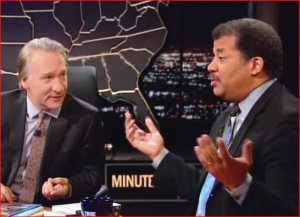
Neil deGrasse Tyson on “Real Time with Bill Maher”, July 25, 2014
In a previous post, I commented on how the Religious Right got upset when “Cosmos” aired last spring. They were angry when “Cosmos” mentioned Giordano Bruno or scientists who were persecuted by religious extremists during their pursuit of truth. They recoiled in horror at how often “Cosmos” reminded us of our cosmic insignificance compared to the scale of the universe, or from the perspective of geologic time. They raged about the fact that “Cosmos” spent an entire episode on on evolution, and the topic of evolution came up repeatedly. And lots of pro-business types hated the episode about Clair Patterson’s lonely fight against the lead manufacturers, who were invisibly polluting the world and poisoning us all. The climate deniers hated that “Cosmos” mentioned anthropogenic global warming many times.
Nonetheless, most of the reviews for “Cosmos” were overwhelmingly positive and there’s good reason to think that it reached much of its target audience, and inspired a lot of people to think about scientific questions in a way that hasn’t happened since the original Sagan version of “Cosmos.” I have been rejoicing at the recent resurgence in the media popularity of science and evolution lately, especially after Bill Nye’s defeat of Ken Ham, the great response to Neil Shubin’s PBS documentary “Your Inner Fish,” and of course, the huge popularity of Neil DeGrasse Tyson and “Cosmos”. Finally, we have several major scientists (Nye, Tyson, Shubin) who are popular in the media, especially on trendy shows like “The Daily Show” and “Colbert Report” as well as national news networks like MSNBC and CNN. They are national celebrities for all the right reasons (smart, articulate, telling people the truth about science and the world), rather than being famous because of reality TV or sports or entertainment. They are becoming widely known, and doing a great job of promoting science against the tidal wave of junk science and pseudoscience in the media. There hasn’t been such high-profile popularity of scientists since the days of Sagan himself. It’s about time! Continue reading…
comments (32)
by
Donald Prothero, Jul 02 2014
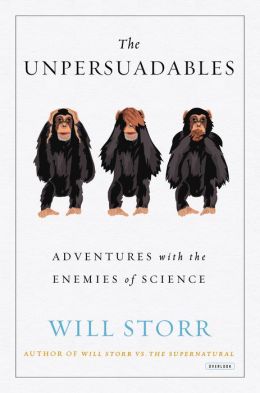
A review of The Unpersuadables: Adventures with the Enemies of Science, by Will Storr (2014, Overlook Press, New York).
Most of us long-term skeptics have had our share of run-ins with people who cling stubbornly to a particular dogma. We get frustrated that no amount of evidence or strong arguments ever changes their point of view. The pattern is true whether you’re dealing with religious beliefs (from creationism to various Eastern religious ideas), or paranormal beliefs (UFO nuts, psychics, ghosts, cryptozoology) or just plain pseudoscience and bad scholarship (homeopathy, past-life regression, Holocaust deniers, climate-change deniers, and many others). Reporter Will Storr decided to go deep into the heart of these various fringe and non-scientific belief systems, interviewing the major figures, taking part in their rituals, and doing his best to give them a fair shake as he embeds himself into their culture. Continue reading…
comments (10)
by
Donald Prothero, Apr 16 2014

A review of
God Bless America: Strange and Unusual Religious Beliefs and Practices in the United States
by Dr. Karen Stollznow
Pitchstone Publishing, Durham, North Carolina
2013, 256 pp.
Man is a Religious Animal. He is the only Religious Animal. He is the only animal that has the True Religion—several of them. He is the only animal that loves his neighbor as himself and cuts his throat if his theology isn’t straight.
—Mark Twain
When I grew up in the Presbyterian Church, we were given a slim little paperback book about the various religious cults and what they believed. We had all heard about the Mormons, the Jehovah’s Witnesses, Scientology, and Christian Science, but as naïve high school kids, we knew nothing about them. It was truly an eye-opener to read all about their strange beliefs, as the book preached why they were wrong and why the Presbyterians were right. At no point did the book turn the mirror on itself, and examine the weird ideas espoused by the Presbyterians and other mainstream Christians.
Then, when I began to study comparative religions in college, I encountered a totally different perspective: the detailed (and often dry) scholarly dissection of world religions. These books were often massive, and included huge detailed sections on the mythologies and core beliefs that soon became overwhelming. It was eye opening to see what other religions reveal about the religion you grew up with, but it was also a lot of hard work. Continue reading…
comments (13)
by
Donald Prothero, Mar 12 2014
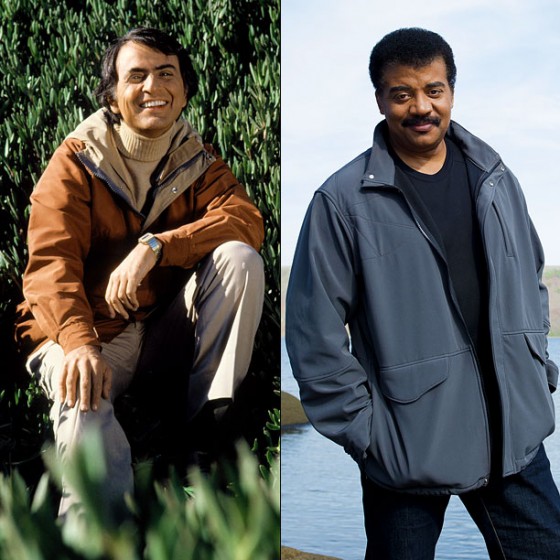
Like many scientists, for over a year I’ve been anxiously awaiting the first episode of the new version of “Cosmos,” starring Neil DeGrasse Tyson. A reboot of the classic series originally done by Carl Sagan in 1980, this version is co-written and co-produced by Sagan’s widow Ann Druyan. It is also co-produced by “Family Guy” creator Seth Macfarlane and by Jason Clark (producer of “42”, “Ted”, and the newly released “Mr. Peabody and Sherman”, which premiered the same weekend; he’s married to former actress Kimberly Beck, a high-school classmate of mine). I figured with these people at the helm, and Tyson as the spokesperson, they would not disappoint. But I was not prepared for how amazing the first episode turned out, even given those high expectations.
It aired on Sunday, March 9, on Fox, which had me a bit concerned, given the political bent of their news network, but this was because Macfarlane has good connections at Fox thanks to “Family Guy”. As the evening started, I was watching my Facebook feed and Twitter to see the reactions from those who saw it in all the time zones before I got my chance in Pacific Daylight Time. I was a bit worried to see a few of my Facebook friends didn’t like the show, but overall it seemed that most of them loved it. Finally, we got the kids to bed and it aired at 9:00 p.m. our time. This is mighty late if they wanted to reach anyone under 12, or for early-to-bed, early-to-rise people like me who get up before 6:00 a.m. It is especially so since we had just gotten the change to Daylight Saving Time that same morning, and most of our biological clocks were out of whack. Continue reading…
comments (29)
by
Donald Prothero, Sep 25 2013
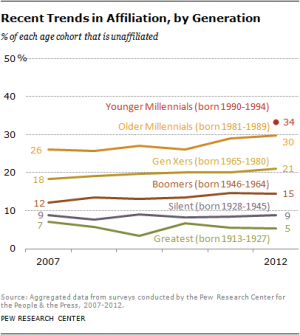
The long-term trends in religiosity over time, broken down by generation.
In previous posts, many of the contributors to this site (along with many scholars of religion in America) have commented on the steady decline in organized religion, especially the decline in the evangelical and fundamentalist churches. The same studies have also shown a remarkable increase in the “religiously unaffliated”, not only atheists and agnostics, but also those who say “nothing in particular” when polled about their religious affiliation and beliefs. According to a Pew study released last October, the “unaffliated” are now about 20% of the general population, outnumbering nearly every other group (Jews, Muslims, Buddhists, Hindus, Mormons, and most Protestant denominations) by a big margin (each of the rest of these groups is 2% or less of the population). Only the Catholics and the Southern Baptists are still more numerous, and both of these are losing ground. And those who said that they had “nothing in particular” in the way of affiliation, 88% also said they were “not looking.” Thus, the decline in religiosity across the board in the U.S. is not some sort of hippy-dippy movement to “New Age” religions from the old stale Protestant churches—but a movement away from any form of organized religion.
Even more striking is how this breaks down demographically. The most remarkable of the trends is how much it is stratified by age. Young people are becoming decreasingly religious, so much so that the youngest cohort (the “Young Millennials,” born 1990-1994) are 34% non-religious! About 30% of the “Older Millennials” (born 1980-1989) are also non-religious, while the “Gen Xers” (born 1965-1980) report 21% “unaffiliated”, so the percentage declines only very slightly as the cohorts age. All of these people together contribute to the overall 20% of “unaffiliated” in the poll, and will increase through time. Clearly, organized religion is fading rapidly in this country, driven by a combination of young people who see no need of it, and the dying off of the older generations that were raised in a strongly religious society. As sociologists like Phil Zuckerman have shown, such trends have already happened to most of the western industrialized nations (especially those in Scandinavia), as the benefits of a modern secular society and modern medicine and science become more central to their lives. Continue reading…
comments (14)
by
Donald Prothero, Jul 31 2013
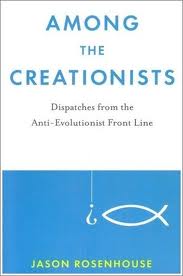
A Review of Among the Creationists: Dispatches from the Anti-Evolutionist Front Lines,
by Jason Rosenhouse
(Oxford University Press, Oxford, 2012, 256 pp.)
I’ve spent over 40 years of my life wrestling with the problem of creationism, while trying to maintain my research career, keep up with book deadlines, teach my classes, and take care of my family. As I described in my 2007 book Evolution: What the Fossils Say and Why it Matters, battling the evolution deniers seems to be a thankless, never-ending task because no amount of effort in science education or good science in the media seems to make any difference. Their numbers (around 40% of Americans) have remained constant in the polls over many decades, no matter what approaches are tried. This is an endless source of frustration for many of us, since creationism is like the many-headed Hydra in the labors of Hercules: every time you cut off one head, it grows back two more. Science never seems to make any progress in blunting their efforts to contaminate schools with their religious dogma. At the end of my 2007 book, I tried my best to delve into the psychology and motivation of creationists, and to understand why they can deny obvious reality and tell outright lies over and over again without any guilt or self-awareness.
But I rarely spend much of my precious time reading their literature any more (I’ve read much of it over 40 years, and it never changes), let alone paying my hard-earned money to hear them speak day after day. Listening to the way they lie and distort the facts, and call professional scientists evil, is too much for me to sit through without getting upset. But Jason Rosenhouse has a much stronger stomach for their garbage than I. He attended one creation conference after another, calmly listening to their preaching and talking to the attendees while maintaining his cool. For that alone, I am in awe of him.
Rosenhouse is Associate Professor of Mathematics at James Madison University in Virginia, having previously taught at Kansas State University, so he is close to the epicenters of much of the creationist movement in this country. He regularly discusses the topic on his EvolutionBlog. As he describes, he is culturally Jewish but became an atheist, yet he has the patience of Job to sit through days and days of creationist drivel and read their atrocious books without getting angry. He is genuinely interested in understanding who they are and what motivates them, and why they can shut themselves out of so much of scientific reality and believe so much that is patently false.
Continue reading…
comments (20)
by
Daniel Loxton, Nov 27 2012
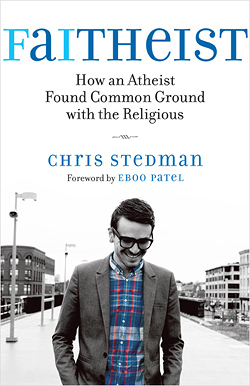 I’m drinking my morning coffee as I write this, and thinking about a moving, thought-provoking book I’ve been reading for pleasure: humanist interfaith activist Chris Stedman’s Faitheist: How An Atheist Found Common Ground with the Religious.
I’m drinking my morning coffee as I write this, and thinking about a moving, thought-provoking book I’ve been reading for pleasure: humanist interfaith activist Chris Stedman’s Faitheist: How An Atheist Found Common Ground with the Religious.
I try to follow a number of firm guidelines for my writing at skeptical platforms like Skepticblog. One is never to talk about anything unless I’ve given that thing a thorough look myself—read the book, seen the movie, tracked down the paper, whatever. Another is to keep my personal politics, humanism, and atheism out of my skeptical writing as much as possible. After all, skepticism is not a private clubhouse for people who share my personal values and opinions; it’s a shared workspace for people of many backgrounds to pursue the useful practical task of investigating fringe science and paranormal claims. (Believe this, don’t believe that—who cares? Science and skepticism are about what we can find out.)
But I’m not a robot. I believe stuff. I enjoy stuff. So today I thought I might break my own guidelines and share a few preliminary personal thoughts about an atheist book I haven’t finished reading, but which I am savoring.
Continue reading…
comments (68)
by
Donald Prothero, Aug 29 2012

A Review of The Republican Brain: The Science of Why they Deny Science—and Reality by Chris Mooney, John Wiley, New York, 327 pages.
Reality has a well-known liberal bias.
—Stephen Colbert
Anti-intellectualism has been a constant thread winding its way through our political and cultural life, nurtured by the false notion that democracy means that ‘my ignorance is just as good as your knowledge’.
—Isaac Asimov
You can’t convince of believer of anything, for their belief is not based on evidence but on a deep-seated need to believe.
—Carl Sagan
Hearing the speakers at the GOP convention spout their ideas this week, I’m again reminded that an entire American political party is proudly and openly espousing views that are demonstrably contrary to reality, from claiming that rape does not cause pregnancy, to claiming that global climate change is a hoax, to even weirder idea, like the bizarre notion that the President of the United States is a Kenyan Muslim. For years, I’ve puzzled over why people can believe such weird things as creationism or other kinds of pseudoscience and science denials. In my 2007 book Evolution: What the Fossils Say and Why it Matters, I devoted an entire chapter to asking why creationists can so confidently believe patently false ideas, and refuse to look at any evidence placed in front of them. I’ve compared it to Alice’s Adventures Through the Looking Glass, where Alice steps through the mirror and finds that the objects and the landscape look vaguely familiar—but all the rules of logic are reversed or turned inside out. How can people continue to believe things that are clearly wrong, and refuse to change their ideas or look at evidence? Continue reading…
comments (125)
by
Donald Prothero, Jul 18 2012
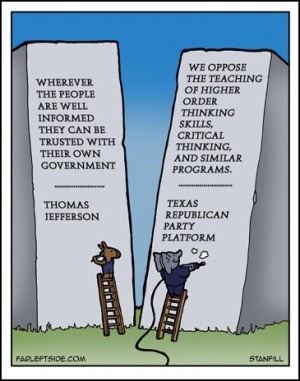
No matter what our political or religious persuasions in the skeptical community, we all hold to some basic ground rules of skepticism. We all agree that critical thinking and questioning authority is a good thing, that humans are easily misled into all sorts of errors of logic, and that it’s easy for any of us to be fooled. Many of our skeptic books are largely about the topic of critical thinking, and the recent efforts by the Skeptic Society to promote critical thinking courses in colleges and universities across the nation are just part of this. Every meeting of CSI, JREF, and other skeptical organizations remind us that critical thinking and questioning authority are essential to getting past the garbage that clutters human thinking and behavior.
In emphasizing critical thinking, we are fully aware that there are powerful organizations (especially religious and some political organizations) that don’t want us to think critically, don’t want us to ask questions, don’t want us to challenge their authority. Many of us are deeply involved in battling religious interference in science and science education, or political interference in scientific and educational decisions made by organizations with clear agendas that don’t stand up to critical scrutiny. Many of us were raised in Sunday School classes where we asked tough questions and were told to shut up, or to stop disrupting class, or something to avoid the fact that the Sunday School teacher had no good answer for that question. We can imagine powerful politicians and their people chatting among themselves privately that those damned skeptics keep messing things up, and we have to stop their interference. Continue reading…
comments (59)
by
Donald Prothero, Jun 06 2012

This past year of electoral politics has been eye-opening in the United States, with GOP presidential candidates (especially Santorum, Perry, and Bachmann) openly advocating a Christian theocracy in this country, and many Republicans showing their scorn for the separation of Church and State (or rewriting history to diminish its importance). Only one (Jon Huntsman) of the original nine GOP candidates accepted evolution, and several were devout creationists (Bachmann got her start fighting for creationism in her local Minnesota school board). We’ve seen the Texas School Board not only pushing creationism, but dropping Thomas Jefferson from the list of “great Americans” because of his secularist views and low regard for established religion. Although the right wing in this country has always had a strong connection to evangelicals and fundamentalism, now they form one of the largest and most dedicated blocs in the GOP, so they dictate a national political stance that openly yearns for a Christian theocracy. Years ago, Barry Goldwater warned about them:
Mark my word, if and when these preachers get control of the [Republican] party, and they’re sure trying to do so, it’s going to be a terrible damn problem. Frankly, these people frighten me. Politics and governing demand compromise. But these Christians believe they are acting in the name of God, so they can’t and won’t compromise. I know, I’ve tried to deal with them. The religious factions that are growing throughout our land are not using their religious clout with wisdom…. I’m frankly sick and tired of the political preachers across this country telling me as a citizen that if I want to be a moral person, I must believe in ‘A,’ ‘B,’ ‘C,’ and ‘D.’ Just who do they think they are?… I will fight them every step of the way if they try to dictate their moral convictions to all Americans in the name of “conservatism.”
For the devil’s bargain that the GOP made back in the 1980s with Jerry Falwell and Oral Roberts and the rest of the evangelical megachurches and their preachers, now their pigeons have come home to roost. Barry would scarcely recognize today’s GOP. Continue reading…
comments (62)







 I’m drinking my morning coffee as I write this, and thinking about a moving, thought-provoking book I’ve been reading for pleasure: humanist interfaith activist Chris Stedman’s
I’m drinking my morning coffee as I write this, and thinking about a moving, thought-provoking book I’ve been reading for pleasure: humanist interfaith activist Chris Stedman’s 

